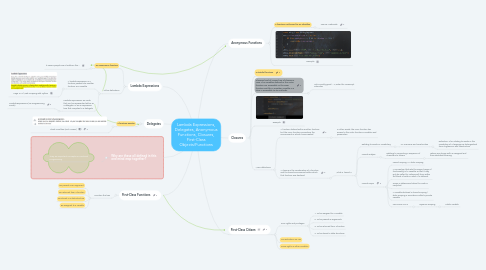
1. Lambda Expressions
1.1. an anonymous function
1.1.1. It seems people are at odds on this...
1.2. Other definitions
1.2.1. A lambda expression is a function passed into another function as a variable
1.2.1.1. Page 31 of Web Scraping with Python
1.2.2. Lambda expressions are code that can be represented either as a delegate, or as an expression tree that compiles to a delegate
1.2.2.1. Lambda Expressions (C# Programming Guide)
2. Delegates
2.1. a function pointer
2.1.1. Stack Overflow (2nd Answer)
3. Why are these all defined in this one mind map together?
3.1. They are important concepts in Functional Programming.
4. First-Class Functions
4.1. Function that can
4.1.1. Be passed as an argument
4.1.2. Be returned from a function
4.1.3. Be stored in a data structure
4.1.4. Be assigned to a variable
5. Anonymous Functions
5.1. a function not bound to an identifier
5.1.1. Source: Hashnode
5.2. Example
6. Closures
6.1. a stateful function
6.2. Closures kind of remind me of classes in Java. The variables defined in the outer function are accessible in the inner function just like a member variable in a class is accessible to its methods.
6.2.1. Link is pretty good... "Master the JavaScript interview"
6.3. Example
6.4. More definitions
6.4.1. A function defined within another function, but the inner function remembers the environment in which it was created
6.4.1.1. In other words, the inner function has access to the outer function's variables and parameters
6.4.2. A closure is the combination of a function and the lexical environment within which that function was declared.
6.4.2.1. What is 'lexical'?
6.4.2.1.1. Relating to words or vocabulary
6.4.2.1.2. Lexical analysis
6.4.2.1.3. Lexical scope
7. First-Class Citizen
7.1. Four rights and privileges
7.1.1. 1. To be assigned to a variable
7.1.2. 2. To be passed as arguments
7.1.3. 3. To be returned from a function
7.1.4. 4. To be stored in data structures
